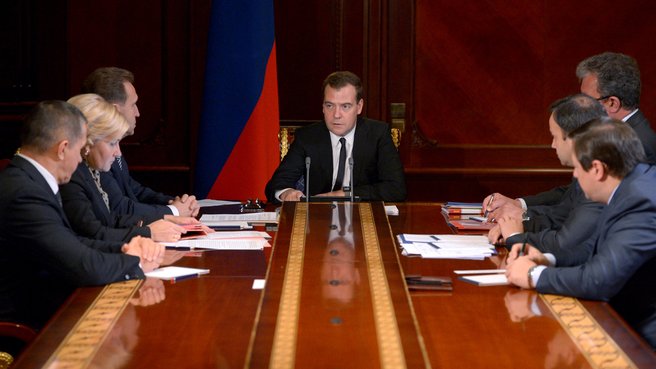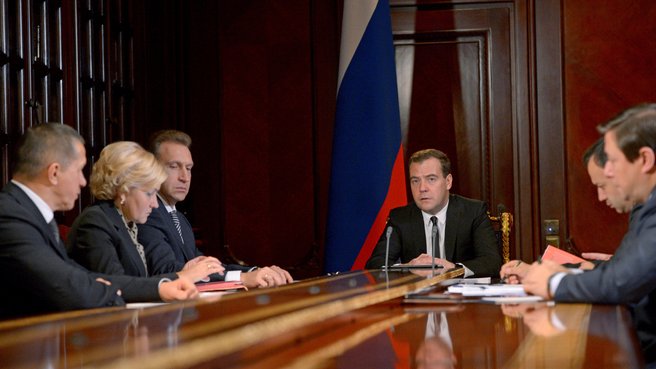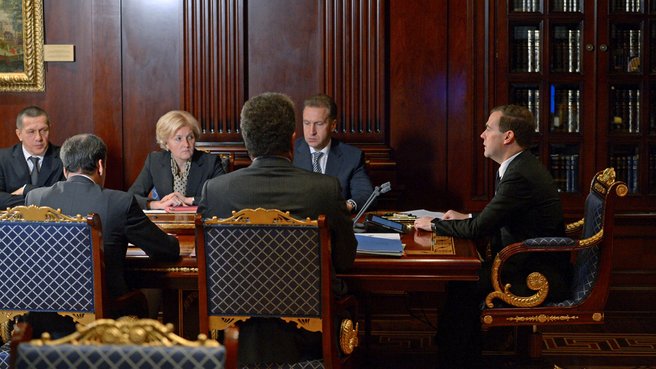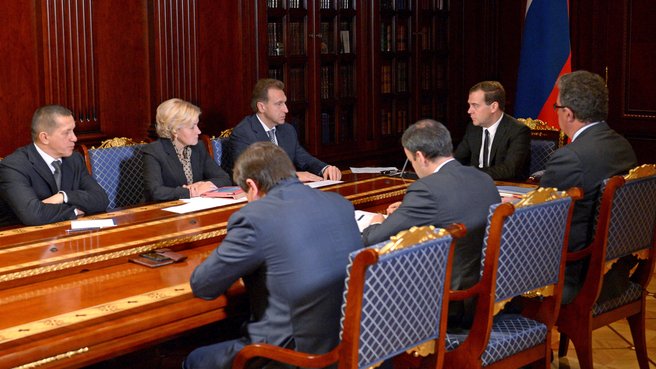Introductory remarks by Dmitry Medvedev
Transcript:
Dmitry Medvedev: A few words about what I’ve been doing. Last week I was in the Far East. Mr Trutnev (Yury Trutnev, Deputy Prime Minister and Presidential Plenipotentiary Envoy to the Far Eastern Federal District) came along as deputy prime minister. We inspected the efforts to clear up the consequences of the flood and to restore normal life in the region and talked with local residents. And then I met with them as party chairman. There are things I’d like to mention and to which I’d like to draw your attention. Although we discussed the consequences of the flood, there are other issues that are typical for that region and some other regions, too. You can’t see everything from Moscow.
One of the things which several people mentioned is the drying out of houses and the use of heat guns. These guns have also been used in other regions. They obviously consume much more electricity than ordinary electric appliances, and the bills are sent to the homeowners who lack money as it is following the disaster. I said this there, but I want to repeat it here. Mr Dvorkovich (Arkady Dvorkovich), please find a way to compensate these expenses, possibly by reducing the electricity rate temporarily as this should not be a permanent decision. This issue should be coordinated with the Ministry of Energy (Mr Trutnev knows our plans).
Another issue concerns proving ownership. This is typical of situations where housing is destroyed. Compensation should be paid for unfinished housing, which therefore was not registered properly, and not only for residential housing: the flood also destroyed commercial property. We not only should ensure the systematic work of the courts but also inform the public and provide targeted assistance, specifically through personal contact. During my visit to the Mendeleyev village, people asked me if they would have to resort to litigation. There could be some misunderstanding, and we need to explain to the public what they need to do to restore their ownership rights. This issue should be dealt with there and then. This is a job for the city and district authorities, and people should know where they can turn for help.
I’d like to say again what I said at [the first] meeting of the Government Commission on the Socioeconomic Development of the Russian Far East. I hope that all Government members will include regular visits to the Far East in their schedules, though not as part of the efforts to clear up the flood consequences (this is very important, but this is the responsibility of one of the deputy prime ministers and the respective minister) but to monitor the overall development of this vast area.
Now a few words about another issue: We are reforming science and creating a modern economic model.
I would like to say that I have signed a Government directive, which ensures proper operation of research agencies, which were previously affiliated with state academies of sciences, during the transitional period, so that all their elements will function normally during the period when these research agencies are transferred from the Academy of Sciences to the Federal Agency for Scientific Organisations with regard to property and economic issues. Naturally, this agency still has to recruit personnel and assert itself, so to say. This year, the funding system will remain the same. But it is important to consider the changes in the organisation of the national science system while discussing the federal budget in the second reading. The document stipulates these instructions for all concerned ministries, and I would also like to draw the attention of the deputy prime ministers overseeing this issue to the document. It contains instructions for the Ministry of Finance, the Ministry of Education and Science, the Ministry of Healthcare and the Ministry of Agriculture – all those departments, which have something to do with the activities of the relevant state academies of sciences.
Dmitry Medvedev: “We need an economy which is largely based on private property, just like all over the world. Therefore, the issues of reducing state presence remain a high-priority area of Government activity, but, of course, when it is profitable and correct to sell property.”
Here is another important issue involving the entire Government economic policy, which was unveiled almost 18 months ago. I have signed a Government directive on the sale of 7% of ALROSA shares, which will be traded publicly on the Moscow Stock Exchange. At the same time, an additional 7% of ALROSA shares, owned by a Russian region, the Sakha Yakutia Republic, will also be traded there. On the whole, the state retains control over the company, but these sales will take place. I am talking about our plans to privatise state property and the need to obtain a number of financial returns. Experts estimate that the federal budget will receive about 18 billion roubles after these holdings of shares are sold.
But, in the long run, this is not the only issue. It is important that we establish a modern economic model, a property management model and a modern national property system. We need an economy which is largely based on private property, just like all over the world. Therefore, the issues of reducing state presence remain a high-priority area of Government activity, but, of course, when it is profitable and correct to sell property. Mr Shuvalov (Addressing Igor Shuvalov), you have prepared this transaction. Please tell us, what has been accomplished, and what will we gain from this.
Igor Shuvalov: Mr Medvedev, first, I would like to say a few words about your instruction to retain state control over the company. The Federal State Property Management Agency (Rosimushchestvo) and the Government of the Sakha Yakutia Republic have started drafting a shareholders’ agreement. According to this document, the Russian Federation and the republic shall jointly own controlling interest in the company, and they shall vote jointly on some issues, just like shareholders usually do, when signing such agreements. Under one of its provisions, subsequent privatisation plans shall be coordinated between the federal Government and the Government of the Sakha Yakutia Republic. The Yakut districts also own about 8% of corporate shares.
Dmitry Medvedev: The district.
Igor Shuvalov: Yes. And local authorities will not be a party in this agreement. However, we realise that it will be necessary to ensure cooperation, and the republic’s authorities are assuming this responsibility.
Dmitry Medvedev: The agreement should state expressly that this is the responsibility of the republic’s authorities.
Igor Shuvalov: We will present the final version of this agreement in the next few days. To be more precise, the work will be finished within 10 days as set by the directive.
Speaking about the privatisation plan that was earlier approved by the Government, as you said, the Russian Federation will alienate 7% of the shares, while Yakutia will alienate another 7% and Alrosa will alienate 2%. As a result, 16% of the shares will become available to the market. We have invited a group of banks to take part in the deal. Goldman Sachs and a banking syndicate are preparing the deal, with Goldman Sachs representing the Government. This group includes all of the best investment banks: JP Morgan, Morgan Stanley, Renaissance and VTB Capital. Therefore, Russian banks participated in the deal. Mr Medvedev, the market situation was rather difficult, both in terms of Alrosa’s shares and recent deals on the stock exchange. At some point, the consultants working with the Government proposed placing the shares not only on the Moscow Stock Exchange but also on the London Stock Exchange. But because we are pursuing the establishment of an international financial centre in Moscow, we eventually decided to involve only one stock exchange and placed the shares only on the Moscow Stock Exchange. We discussed the lowest price that we could offer to the market with our consultants and concluded that the lowest price would be 35 roubles.
Dmitry Medvedev: So this is the minimum price.
Igor Shuvalov: Yes, the minimum price. I would like to add that for some it is bad news, which is not true because at the time of the decision the price was higher than the market average. When we balanced the books last week, 35 roubles per share was higher than the current value. The value was 35.65 to 35.85 roubles at different times but at the closing of business the price was, however, under 35 roubles. We have a 28% oversubscription rate as a result of a deal with candidates.
Speaking of the shareholder quality, these are the best investment funds and shareholders that are determined to be long-term Alrosa shareholders. I should say that both the representatives and the syndicate have succeeded. We have told the investors that the next steps regarding the sales of Alrosa shares will be weighed carefully. In any case, the terms of the deal state that the Government must not offer any additional shares to the market for 180 days. There are still opportunities for more privatisation deals.
Dmitry Medvedev: Do you mean more opportunities are available for privatisation deals, while still holding the controlling share?
Igor Shuvalov: Yes, the Government will still hold the controlling stock.
Speaking about the deal in the mineral resources sector, or the “mining industry,” as it is called, all of the experts stress that this will be a very good deal. It would be the biggest deal since 2011 and bring 18 billion roubles apiece to the budgets of the Russian Federation and Yakutia, as well as over 5 billion roubles to the company itself. Let me repeat again that it is important not only in terms of gaining money but in terms of improving the structure of the shareholders’ equity and the corporate management rules. This morning, around 10 am, when the outcome of the deal was announced, the market price…
The stock was trading above 35 roubles per share when the market opened at 10 am today, after the details of the deal became known.
Dmitry Medvedev: Good. Keep an eye on these processes and show the draft document to me later.
There’s one more issue that is not as closely related to the economy, although it still is, of course. It concerns our goals for the construction of perinatal centres. It is impossible to improve the demographic situation and support mothers and children without building new centres.
We took up this task seven years ago. The steps we are taking produce results: the birth rate is gradually increasing. It grew by almost one third over the past six years that we’ve been implementing this programme. Of course, this is a good result. We’ve managed to achieve such results by improving, among other things, perinatal medicine.
Work in this area should continue. Recently, I signed a directive allocating subsidies for the construction of perinatal centres in 30 Russian regions. The total amount of funding stands at 52 billion roubles, which is a lot of money. Even amid current budget constraints, we are not trying to scrimp on the construction of centres, so we should focus on spending this money carefully. We must make sure not only that the money makes it to the regions, but also that the centres open on schedule without any excuses. This requires serious monitoring.
<…>














